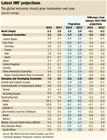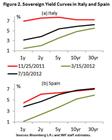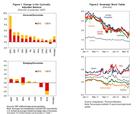The IMF about Global Economy: Slower Growth, Greater Risks
Ralitsa Kovacheva, July 17, 2012
 The IMF has lowered its forecast for the global economic growth, compared to April this year, by 0.1% to 3.5%. The outlook for 2013 provides for growth of 3.9% or 0.2% less than the Fund's forecast in April. The main reasons for the more pessimistic expectations are the ongoing crisis in the eurozone and slower growth in the developing economies. “More worrisome than these revisions to the baseline forecast is the increase in downside risks,” said Olivier Blanchard, the IMF chief economist and director of the IMF’s Research Department, which prepares the World Economic Outlook.
The IMF has lowered its forecast for the global economic growth, compared to April this year, by 0.1% to 3.5%. The outlook for 2013 provides for growth of 3.9% or 0.2% less than the Fund's forecast in April. The main reasons for the more pessimistic expectations are the ongoing crisis in the eurozone and slower growth in the developing economies. “More worrisome than these revisions to the baseline forecast is the increase in downside risks,” said Olivier Blanchard, the IMF chief economist and director of the IMF’s Research Department, which prepares the World Economic Outlook.
Moreover, the latest World Economic Outlook is based on three important assumptions: that the eurozone will take policy measures to ease the financial conditions in the periphery, that the US fiscal policy will not tighten sharply in 2013 and that some emerging markets will take measures to stimulate growth.
In 2012 and 2013 the developed economies will grow by 1.4% and 1.9% and the forecast for next year has been revised downward. According to the IMF, "the most immediate risk to the global recovery is that delayed or insufficient policy action will further escalate the euro area crisis". This year the eurozone will mark negative growth and is projected to grow by 0.7% in 2013. The IMF`s outlook is more pessimistic than the spring forecast of the European Commission in terms of growth in 2013 which, according to Brussels, will be around 1%. The German economy has experienced a significant slowdown compared to the previous two years and will increase by 1% this year and 1.4% next year. France will mark minimal growth of 0.3% this year and 0.8% next year.
The bad news is that Spain and Italy will mark negative growth both this and next year, as the Spanish outlook for 2013 has been lowered by 0.7% compared to the April expectations. "Italy and Spain have to succeed," Olivier Blanchard stated bluntly. The IMF notes that both countries “are implementing sizable fiscal consolidation in the next two years in efforts to improve debt dynamics and regain market confidence”.
Spanish outlook for 2013 has been lowered by 0.7% compared to the April expectations. "Italy and Spain have to succeed," Olivier Blanchard stated bluntly. The IMF notes that both countries “are implementing sizable fiscal consolidation in the next two years in efforts to improve debt dynamics and regain market confidence”.
As euinside wrote, Spain received the blessing of the EU to change its fiscal targets and was given one additional year to put its budget deficit into the limit of 3% of GDP. The government should reduce the deficit to 6.3% of GDP this year, and to 4.5% in 2013. On 13 July the Spanish government announced additional fiscal measures worth 65 billion euros. The measures include a significant increase in tax revenues, including VAT, corporate income tax, personal income tax and excise duties. In terms of expenditure, the unemployment benefit regime will be reviewed and the public sector wage bill will be reduced. In addition, social security contributions will be reviewed and pension reforms will be carried out.
The fiscal adjustment of 65 billion euros is allocated in the upcoming years as follows: 13.5 billion euros by the end of 2012, 22.9 billion euros in 2013 and 20 billion euros in 2014. In parallel, the country will receive a loan amounting up to 100 billion euros from the eurozone rescue fund to recapitalise and recover the banking system. The state will not take any guarantees for the loan, which will not be considered government debt.
In Italy, the deficit is significantly lower and the country will achieve a small structural surplus in 2013, according to the IMF. The problem of Italy is the huge debt, amounting to 123.5% of GDP, and the pressure exerted by the financial markets on the country which is why Prime Minister Mario Monti was urging the rescue fund to be allowed to buy government bonds without requiring a rescue programme to be signed. In early July, the IMF mission in Italy recommended the government to reduce costs rather than increase taxes, starting with the public sector wage bill. The country should continue the ongoing growth supportive structural reforms and take measures to stabilise the banking system.
Fiscal adjustments are underway, too, in the three programme countries (Ireland, Portugal and Greece) but "the recent deterioration in the political and economic climate in Greece serves as a warning about the potential onset of “adjustment fatigue,” which remains a threat to continued program implementation," the IMF warns.
"The utmost priority is to resolve the crisis in the euro area," the IMF states while saying good words about the recent decisions by EU leaders at their summit in late June in terms of common banking supervision and direct recapitalisation of banks by the European Stability Mechanism (ESM). In the short term politicians in Europe have to deal with the uncertainty about bank asset quality and support the strengthening of banks’ balance sheets. Countries should also fulfil their commitments to strengthen public finances and implement structural reforms. "These steps must be complemented by more progress toward a full-fledged banking union and deeper fiscal integration. For the banking union, the steps toward a single regulator must be complemented by a pan-European deposit insurance guarantee scheme and bank resolution mechanism with common backstops."
The IMF`s Fiscal Monitor Update notes that the completion of the monetary union, as suggested in the report of the “Four Presidents”, “could mean sufficiently large resources at the centre matched by proper democratic controls and oversight. Introduction of a limited form of common debt, with appropriate governance safeguards, could provide an intermediate step towards greater fiscal integration. Issuance of such securities could, at first, be relatively small and restricted to shorter maturities, and could be conditional on more centralised control (e.g., limited to countries that deliver on policy commitments; veto powers over national deficits; pledging of national tax revenues).” According to IMF, this common debt financing could be used for the common deposit guarantee scheme and bank resolution fund in the future banking union.
The European Central Bank has more to do in terms of monetary policy continuing to provide "ample liquidity support to banks under sufficiently lenient conditions", the IMF says. It recommends the ECB to keep using nonstandard measures as buying sovereign bonds of distressed countries and longer-term refinancing operations (LTROs) to banks with lower collateral requirements.
The US will grow by 2% in 2012 and 2.3% in 2013. However, according to Mr Blanchard, this growth will not be sufficient to reduce unemployment. The IMF notes that if sharp spending cuts are made and the debt ceiling is not increased this will adversely affect the US growth, causing significant spillovers to the rest of the world. Overall, fiscal adjustment in developed economies is in line with the expectations as their budget deficits are forecast to decline by about 0.75 percent of GDP this year and about 1 percent of GDP in 2013. "A focus on nominal deficit targets could lead to excessive tightening if growth weakens in advanced economies," said Carlo Cottarelli, Director of the IMF’s Fiscal Affairs Department. According to him, "for countries that have space to do so, focusing instead on the measures to be implemented to improve the public finances would be preferable."
Although marking a significantly higher growth than the developed economies, 5.6% for 2012 and 5.9% for 2013, emerging economies have also slowed down, especially Brazil (2.5% for 2012 and 4.6% for 2013), China (8% for 2012 and 8.5% for 2013) and India (6.1% for 2012 and 6.5% for 2013.). This is due to a weaker external environment and the sharp contraction of domestic demand. The Central and Eastern Europe region will grow by 1.9% in 2012 and 2.8% in 2013. Russia is projected to grow by 4% in 2012 and 3.9% in 2013. Developing Asia region has also slowed its growth to levels of 7.1% for 2012 and 7.5% for 2013. "In contrast to the broad trends in the rest of the world, growth in the Middle East and North Africa will be stronger," the fund notes, mainly due to boosted oil production and increased domestic demand.
for 2012 and 5.9% for 2013, emerging economies have also slowed down, especially Brazil (2.5% for 2012 and 4.6% for 2013), China (8% for 2012 and 8.5% for 2013) and India (6.1% for 2012 and 6.5% for 2013.). This is due to a weaker external environment and the sharp contraction of domestic demand. The Central and Eastern Europe region will grow by 1.9% in 2012 and 2.8% in 2013. Russia is projected to grow by 4% in 2012 and 3.9% in 2013. Developing Asia region has also slowed its growth to levels of 7.1% for 2012 and 7.5% for 2013. "In contrast to the broad trends in the rest of the world, growth in the Middle East and North Africa will be stronger," the fund notes, mainly due to boosted oil production and increased domestic demand.